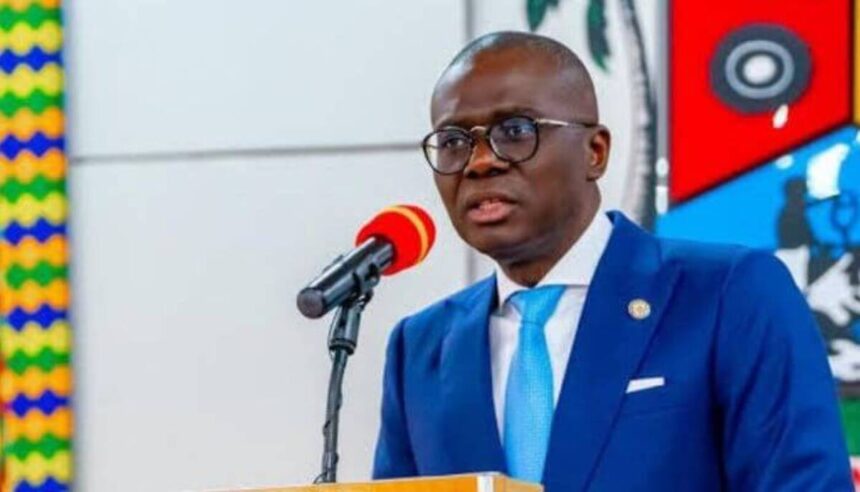No fewer than 3,786 street traders, environmental polluters, and cart pushers were arrested and prosecuted by the Lagos State Government in the past year.
The Commissioner for the Environment in Lagos State, Dr Tokunbo Wahab, disclosed this during the Ministerial Press Briefing showcasing the achievements of Governor Babajide Sanwo-Olu over the last six years.
In addition, he said that almost 700 persons were arrested for highway crossing, which endangered their lives.
The commissioner, who reeled out the governor’s achievements in policy formulation, environmental protection, waste management, water provision, and enforcement, among others, stated that the main enforcement agency, Kick Against Indiscipline (KAI), in collaboration with the State Task Force on Environmental and Special Offences, undertook the clearing of rail tracks and the demolition of shanties and illegal structures under the Apongbon Bridge, Lekki, Victoria Island, Agege, Obalende, and along the Lagos–Badagry Expressway corridor.
“A total of 3,786 street traders, environmental polluters and cart pushers were arrested and prosecuted,” he said.
To ensure a flood-free Lagos, Wahab said the present administration had embarked on the construction of 22.9 kilometres of collector drains and 12.43 kilometres of primary channels between 2023 and 2024, which are at various stages of completion across the state. He further disclosed that an additional 36.44 kilometres of collector drains are currently undergoing procurement processes for award in 2025.
He said: “A total number of 666,740.50 kilometres of 397 secondary collectors was maintained/cleaned up between the year 2023 till date.
In 2023, 144 secondary collectors with a total length of 257,399 km were cleaned.
“In the year 2024, secondary collectors cutting across areas like Victoria Island, Ikoyi, and Lagos Island were cleaned, and this was calculated as 181 number of collectors with a total length of 242,495 km.
“As at the end of March 2025, the Drainage Maintenance/EFAG Team has worked on secondary collectors, particularly focusing on Victoria Island, Ikoyi and Lagos Island and environs, cleaning 72 collectors which translates to 166,846.50 km in length.”
It will be recalled that Lagos State, a sub-national entity with an estimated population of over 22 million, generates more than 13,000 metric tonnes of solid waste daily.
The commissioner said that the present administration of Mr Babajide Olusola Sanwo-Olu, in line with his THEMES Plus Agenda and building on the gains of his first term, remains fully committed to environmental sustainability. This, he said, has led to the development of a comprehensive, multi-sectoral approach to ensure a clean, resilient and liveable city.
“The administration under the inspirational leadership provided by Mr Governor believes that providing innovative solutions to the management of the 13,000 tonnes of waste generated daily lies at the heart of unlocking the problem of waste management in the state in addition to transitioning from a linear ‘collect and dump’ system to a sustainable circular economy,” the commissioner said.
According to him, providing workable, practical solutions to managing daily waste would ensure that only a reduced volume reaches the state’s landfill sites. He added that it would also help to reduce incidences of flash floods across the metropolis.
“Instead of our drains being filled with waste, sand and silt will have its way as it naturally should be, thus allowing water from the various channels to empty into its natural sources instead of sputtering on the roads.
This is because our drains can effectively contain runoffs,” he said.
On partnerships to tackle the waste management crisis, Wahab revealed that the state government had signed several Memoranda of Understanding (MoUs) with reputable international, multilateral and experienced companies. These partnerships aim to develop waste-to-resource initiatives, improve solid and liquid waste collection and recycling, and establish a smelting plant for processing electronic waste — thereby positioning Lagos as a leader in e-waste recycling.
To underscore the priority placed on strategic partnerships, Wahab noted that Governor Sanwo-Olu personally signed an MoU last May with a Dutch firm, Harvest Waste Consortium, for the construction of a high-efficiency 60–80 MW Waste-to-Energy plant at the Epe landfill. The facility will use advanced technology to generate clean energy from municipal, commercial, and industrial solid waste and will consume 2,500 tonnes of municipal waste daily.
The commissioner added that the waste-to-energy solution could take up to 40,000 homes off the national electricity grid, as the technology is expected to generate between 60 and 75 megawatts of base-load electricity annually.
He continued: “The state has also initialled a major agreement with Jospong Group, represented by Zoomlion Nigeria, for the construction and operation of Material Recovery Facilities (MRFs) and Transfer Loading Stations (TLS) in key areas.
The partnership also includes processing 3,500 tonnes of solid waste and 4,000 cubic metres of liquid waste daily, thereby improving collection and recycling efficiency.
“Others include the signing of an MoU with Netherlands-backed company ‘Close the Loop’ BV to establish an e-waste smelter plant in Lagos to manage the vast deposits of electronic waste in the state while creating new jobs and a new economy.
Another milestone was the MoU signed with Swedish-backed companies on turning solid and liquid waste into energy across the state,” the commissioner stated.
He further disclosed that the state also entered into an MoU with Green Deal Company for the processing of plastic waste into oil, providing a circular solution for plastic waste pollution. In addition, another MoU was signed for the establishment of a smelting plant to process electronic waste and further reinforce Lagos’s leadership in e-waste recycling.
ALSO READ: FCT renews commitment to eradicating malaria
“The latest of such MoUs was signed by the state with Lafarge Africa/Geocycle for the treatment of non-recyclable combustible waste, diverting waste from landfills and converting it into industrial energy.
We are of the firm belief that these partnerships will ensure Lagos remains at the forefront of waste recovery, recycling and energy generation,” he said.
He noted that the government had adopted a pragmatic and decisive approach to transitioning to a sustainable circular economy, including the banning of the sale, distribution, and use of Styrofoam food packs — a major contributor to urban flooding and blocked drains — over a year ago. Positive results have since emerged from the drainage clearance process.
“We have also, in line with our commitment, commenced enforcement of a ban on single-use plastics from the beginning of 2025 while promoting sustainable alternatives and extended producer responsibility.
“We have also been upbeat in the last two years concerning the way we confronted the menace of industrial effluent discharge into the Lagos waterways, bringing about a drastic reduction to 25 percent due to the proactive consistency of the Lagos State Environmental Protection Agency (LASEPA) in regulating their discharge through permits, fines, penalties, and outright publicised sealing off.
The agency is also responsible for conducting yearly training for effluent treatment plant handlers in industries to ensure that the handlers are up to date on current trends in wastewater treatment and plant operation,” he said.
ALSO READ TOP STORIES FROM NIGERIAN TRIBUNE
WATCH TOP VIDEOS FROM NIGERIAN TRIBUNE TV
- Let’s Talk About SELF-AWARENESS
- Is Your Confidence Mistaken for Pride? Let’s talk about it
- Is Etiquette About Perfection…Or Just Not Being Rude?
- Top Psychologist Reveal 3 Signs You’re Struggling With Imposter Syndrome
- Do You Pick Up Work-Related Calls at Midnight or Never? Let’s Talk About Boundaries







